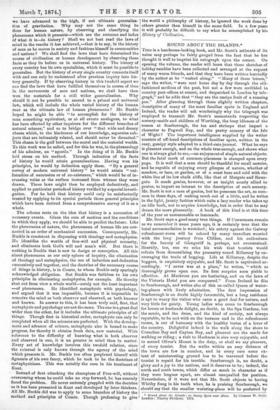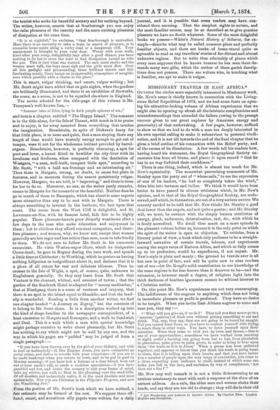ROUND Asour THE ISLANDS.* Tam is a handsome-looking book, and
Mr. Scott's estimate of its value may perhaps be fairly gauged from the fact that he has thought it well to imprint his autograph upon the corner. On opening the volume, the reader will learn that these sketches of holiday rambles have been collected and arranged at the request of many warm friends, and that they have been written hurriedly by the author as he "rushed along." "Many of these letters," says the writer, "were sent home day by day through the old- fashioned medium of the post, but not a few were scribbled in country post-offices at sunset, and despatched to London by tele- graph," and he adds that "they are the unripe fruit of a running pen." After glancing through these slightly written chapters, descriptive of many of the most familiar spots in England and Ireland, the reader will ask wonderingly why the telegraph was employed to transmit Mr. Scott's memoranda respecting the nursery-maids and children of Worthing, the busy idleness of the season at Scarborough, the tea and shrimps that impart a character to Pegwell Bay, and the pretty scenery of the Isle of Wight ? The important intelligence supplied by the writer consists of off-hand descriptions of familiar spots, written in the easy, gossipy style adapted to a third-rate journal. What he says is pleasant enough, and on the whole true enough, and shows what one is always glad to see,—an enjoyment of simple natural objects. But the fatal mark of common-placeness is stamped upon every page. It is well that a man should be thankful for small mercies, and be capable of enjoying every glimpse of nature, whether of meadow, or lane, or garden, or of a coast bare and cold with the white line of its low chalk cliffs, like that of Margate and Rams- gate. It needs genius, however, or an insight nearly allied to genius, to impart an interest to the description of such scenery. Mr. Scott is not a man of genius, but he possesses the art, so com- mon in these days, of making much out of a little, and he writes in the light, jaunty fashion which suits a lazy reader who takes up an idle book, not to acquire knowledge, but in order that he may dream the more pleasantly. A book of this kind is at this time of the year as unseasonable as lemonade.
Mr. Scott says a good many true things. If Connemara remain as we remember it some years ago, it is certainly true that the hotel accommodation is wretched ; his outcry against the Galway refreshment-room will be echoed by many travellers wearied with the long journey from Clifden, and his enthusiasm for the beauty of Glengariff is, perhaps, not overstrained. Heartily, too, can we echo his wish that tourists would refrain from demoralising the peasantry round Killarney by en- couraging the trade of begging. Life at Killarney, despite the beggars, is exquisitely enjoyable, and Mr. Scott is captivated ac- cordingly. "I never was at a place," he writes, "which so thoroughly grows upon one. Its first surprise soon yields to affection. At Muckross you are hesitating, and on the lawn of the Victoria Hotel you are conquered." From Ireland he flits to Scarborough, and writes also of this so-called Queen of water- ing-places with lively admiration. The first impression of Scarborough is no doubt highly favourable, but a long residence is apt to weary the visitor who cares a good deal for nature, and very little for gaiety. Young ladies who come to Scarborough for lovers or husbands delight, no doubt, in the Spa Gardens, but the music, and the dress, and the kind of society, not always reputable, to be met with on the terraces and in the refreshment rooms, is out of harmony with the healthy tastes of a lover of the country. Delightful indeed is the walk along the shore to Cornelian Bay and Cayton Bay, and pleasant are the sands for walking or riding ; a visit to Hackness is also very enjoyable, and to ascend Oliver's Mount is the duty, or shall we say pleasure, of every tourist. But the walks within an easy distance of the town are few in number, and in every case some ex- tent of uninteresting ground has to be traversed before the tourist is repaid for his trouble. Scarborough is, no doubt, a glory and a joy to the natives, and it deserves to be ; indeed, the north and south towns, which differ as much in character as if they were leagues apart, are almost unequalled for positiou. Nevertheless, if it were not that Mr. Scott objects to having Whitby flung in his teeth when he is praising Scarborough, we should say that the smaller watering-place will be preferred by * Round about the Mends ; or, Sunny Spots near Home. By Clement W. Scott. London : Tinsley Brothers. 1874.
the tourist who seeks for beautiful scenery and for nothing beyond. The writer, however, asserts that at Scarborough you can enjoy the calm pleasures of the country and the more exciting pleasures of dissipation at the same time.
"It is at nightfall," he exclaims, "that Scarborough is unrivalled. Here there is no necessity to take a train in search of pleasure, or to scramble home again along a rocky road or a dangerous cliff. Your amusement is brought to your very door. Weary with your walk, tired after your romp, delightfully lazy after a good dinner, you have nothing to do but to cross the road to find dissipation turned on with the gas. This is just what was wanted. The men must smoke and the women must talk, the boys must sigh and the girls must flirt. Over all this gaslight and promenading, these brilliant shawls and this fascinating music, there hangs an inexpressible atmosphere of naughti- ness which possibly adds a charm to the place."
This is smart, vulgar thinking, and smart, vulgar writing ; but Mr. Scott might have added that on gala nights, when the gardens are brilliantly illuminated, and there is an exhibition of fireworks, the scene, as a scene, is not to be equalled elsewhere in England. The motto selected for the title-page of this volume is 111.r.
Tennyson's well-known line,—
" Summer isles of Eden lying in dark purple spheres of sea and here is a chapter, entitled "The IIappy Island." The romance is in the title alone, for the Isle of Thanet, with much in it to praise and to enjoy, is far away removed from everything that touches the imagination. Broadstairs, in spite of Dickens's fancy for that little place, is so tame and quiet, that a man staying there any length of time would have scarcely energy enough to get out of temper, were it not for the wholesome irritant provided by barrel- organs. Broadstairs, however, is perfectly charming, a spot for poet and lover, a haunt fitted to bewilder the city-liver with its loveliness and liveliness, when compared with the desolation of Westgate, "a neat, well-built, compact little spot," according to
Mr. Scott, "with a bold sea-frontage and an intoxicating air." Then there is Margate, strong, no doubt, in ozone but plain in features, and in manners during the season persistently vulgar. However, Margate, we are told, is "improving," and there is room
for her to do so. Moreover, no one, as the writer justly remarks, comes to Margate for the romantic or the beautiful. Neither does he go in search of them to Ramsgate, which has about it some aspects more attractive than any to be met with in Margate. There is always something to interest in the harbour, the best upon that coast. The scene from the West Cliff is delightful, and St. Lawrence-on-Sea, with its famous hotel, bids fair to be highly popular. These pleasure-haunts grow dismally wearisome after a few days to the man who seeks relaxation and enjoyment in them ; but to children they afford constant occupation, and there- fore pleasure ; and women, why, we know not, except that women generally are less eager and less active than men, seem to take kindly to them. We do not care to follow Mr. Scott in his numerous excursions. He visits 1Vestou-super-Mare, which he designates 'Ozone-land; he goes to Bognor during the race week, and spends a little time at Chichester ; to Worthing, which he praises as having nothing Liliputian or iusiguificaut about it, and declares that it is a place of all others for rest and delicious idleness. Then he crosses to the Isle of Wight, a spot, of course, quite unknown to Englishmen generally. So they may learn from Mr. Scott that Ventnor is the cleanest, whitest, and sunniest of towns ; that the garden of the Sandrock Hotel is adapted for "moony meditation," that at Blackgang there is a sense of vastness and majesty, that there is no spot in the island equal to Slaankliu, and that the land- slip is wonderful. Stealing a little from another writer, we find
one chapter headed "A Journey en Zigzag," but the contents of it belong to Mr. Scott alone. It is a description worked up into the kind of shape familiar to the newspaper correspondent, of a boat excursion to Margate and Ramsgate, and a walk to Sandwich and Deal. This is a walk which a man with special knowledge might perhaps contrive to write about pleasantly, but Mr. Scott has nothing to say which might not be said by any one, and the way in which his pages are " padded " may be judged of from a single paragraph :—
"If you have been thrown over by the girl of your idolatry, and wish to feed on melancholy—if, like Eugene Aram, you have committed an awful crime, and desire to wrestle with your conscience—if you are to be made bankrupt when you return to town, and to be put in gaol on Monday morning—if you have lost a fortune or a dear friend, been cut out of your uncle's will, or made a reckless speculation—if you have gambled and lost, and desire the scenery to suit your frame of mind, -take my advice, and walk to Deal in the gloaming over the sand-hills. Of all desolate and melancholy walks, it is the most desolate and most melancholy. Now you are Christian in the Pilgrim's Progress, and now the Wandering Jew."
From the portion of Mr. Scott's book which we have noticed, a
• fair estimate may be formed of the rest. We suppose these off- hand, smart, and sometimes silly papers were written for a daily
journal, and it is possible that some readers may have con- sidered them amusing. That the simplest sights in nature, and the most familiar scenes, may be so described as to give genuine pleasure we have no doubt whatever. Some of the most delightful books we rossess—White's Natural History of Selborne, for ex- ample—deicribe what may be called common-place and perfectly familiar objects, and there are books. of home-travel quite as agreeable to read as any travellers' stories of far-distant and almost unknown regions. But to write thus admirably of places which every man supposes that he knows because he has seen them de- mands many rare gifts, which the author of these garish descrip- tions does not possess. There are writers who, in touching what is familiar, are apt to make it vulgar.



































 Previous page
Previous page